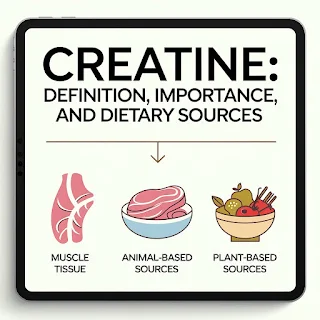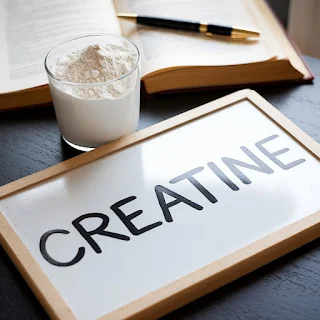Creatine: Definition, Importance, and Dietary Sources
Creatine is a naturally occurring compound that plays a crucial role in energy production within the body. It is primarily stored in the muscles and used during high intensity activities such as weightlifting, sprinting, and other forms of exercise that require quick bursts of energy. Known for its effectiveness in enhancing athletic performance and muscle growth, creatine is one of the most popular and extensively researched dietary supplements. In this article, we will explore what creatine is, its importance to the human body, and the dietary sources from which it can be obtained.
What is Creatine?
Creatine is a nitrogenous organic acid that is produced naturally in the body, primarily in the liver, kidneys, and pancreas. About 95% of the body’s creatine is stored in skeletal muscles in the form of phosphocreatine, while the remaining 5% is found in the brain, heart, and other tissues. Creatine helps regenerate adenosine triphosphate (ATP), which is the primary energy carrier in cells, during short bursts of intense physical activity. This regeneration process is vital for activities that require quick, explosive energy, such as weightlifting, sprinting, and high-intensity interval training (HIIT).
The body synthesizes creatine from the amino acids glycine, arginine, and methionine, but it can also be obtained from dietary sources and supplements. Although the body can produce creatine, the amount synthesized is often not enough to fully saturate muscle creatine stores, which is why many athletes and individuals who engage in regular high intensity exercise choose to supplement with creatine.
Importance of Creatine:
1. Enhances Athletic Performance:
One of the most well known benefits of creatine is its ability to enhance athletic performance. By increasing the availability of phosphocreatine in muscles, creatine supplementation allows for faster ATP regeneration, which leads to improved strength, power, and overall performance during high-intensity exercise. Numerous studies have shown that creatine supplementation can increase strength gains from resistance training by 5-15%.
2. Supports Muscle Growth:
Creatine promotes muscle growth by increasing water content within muscle cells, making them appear fuller and more voluminous. Additionally, creatine enhances muscle protein synthesis, which aids in the repair and growth of muscle fibers after exercise. This makes creatine particularly beneficial for bodybuilders, weightlifters, and anyone looking to increase muscle mass.
3. Improves Recovery:
Creatine can help reduce muscle damage and inflammation following intense exercise, which aids in faster recovery. This allows athletes to train more frequently and at higher intensities, contributing to greater overall gains in performance and muscle size.
4. Boosts Cognitive Function:
Emerging research suggests that creatine may also have cognitive benefits, particularly in tasks that require short term memory and quick thinking. The brain uses a significant amount of energy, and creatine supplementation has been shown to enhance cognitive function by providing additional ATP for brain cells, especially during periods of mental fatigue or stress.
5. Supports Bone Health:
Some studies have indicated that creatine may have a positive effect on bone health by promoting the activity of cells that build bone (osteoblasts) and reducing the activity of cells that break down bone (osteoclasts). This could potentially help in preventing osteoporosis and improving bone density, particularly in older adults.
6. Helps with Certain Medical Conditions:
Creatine has been investigated for its potential benefits in various medical conditions, including muscular dystrophy, Parkinson’s disease, and heart failure. While more research is needed, creatine supplementation has shown promise in improving muscle strength and reducing fatigue in individuals with these conditions.
Dietary Sources of Creatine:
Creatine can be found in various dietary sources, primarily from animal-based foods. Here are some of the main food sources of creatine:
1. Red Meat:
Red meat,such as beef, pork, and lamb, is one of the richest sources of creatine.A 1-pound (450-gram) steak contains approximately 1-2 grams of creatine. Including red meat in your diet can help boost creatine stores, although it is often not sufficient to reach the levels needed for performance enhancement without supplementation.
2. Fish:
Certain types of fish, particularly herring, salmon, and tuna, are good sources of creatine. For example, 1 pound (450 grams) of herring can provide up to 2 grams of creatine. Fish is also a good source of omega-3 fatty acids, which offer additional health benefits.
3. Poultry:
While poultry contains less creatine than red meat and fish, it still contributes to dietary intake. Chicken and turkey provide moderate amounts of creatine, making them suitable options for those looking to increase their intake through food.
4. Eggs and Dairy:
Eggs and dairy products, like milk and cheese, contain very small amounts of creatine. Although they are not primary sources, they can still contribute to overall intake, especially when consumed as part of a balanced diet.
5. Creatine Supplements:
For those who do not consume meat or fish, or for athletes looking to maximize their creatine stores, creatine supplements are a convenient and effective option. Creatine monohydrate is the most common and well researched form of creatine supplement and is known for its high bioavailability and safety.
Conclusion
Creatine is a vital compound that supports energy production, enhances athletic performance, promotes muscle growth, and may even provide cognitive benefits. While the body can synthesize creatine from amino acids, the amount produced is often insufficient for individuals engaging in high-intensity exercise. Including creatine rich foods like red meat, fish, and poultry in your diet can help boost creatine stores, but supplementation is often necessary to achieve optimal levels for performance enhancement.
Whether you’re an athlete looking to improve your strength and endurance, or simply interested in supporting your overall health, understanding the role of creatine and how to incorporate it into your diet can be a valuable step towards achieving your fitness and health goals. As always, consult with a healthcare provider before starting any new supplement regimen to ensure it aligns with your individual needs and health conditions.


